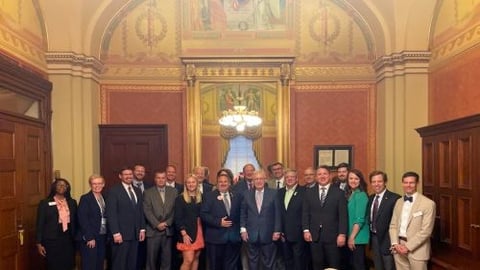How Retailers Can Stay Ahead of Legislation Targeting Junk Food at Checkout
A new academic paper focusing on indulgent products provides insights for more informed retail checkout strategies and policymaking approaches. The report, "All Indulgent Products are Not Created Equal," highlights CPG and industry efforts to help consumers make informed, balanced choices at the point of sale and also underscores key differences in indulgent product purchases among today’s shoppers.
The report was published by Business for Impact at Georgetown University’s McDonough School of Business and authored by Hank Cardello, executive director of the Leadership Solutions for Health and Prosperity Program at Georgetown University’s Business for Impact, and Richard Black, Ph.D., an adjunct professor at Tufts University Friedman School of Nutrition Science and Policy and McGill University’s Desautels School of Management. Supported by the National Confectioners Association, the study examined the purchase, consumption and usage patterns for several indulgent food and beverage categories to better understand the roles individual food sectors have on diet and assess their connection to obesity.
[Read more: "Candy Companies Make Good on Consumer Transparency Pledge"]
In short, the authors concluded, the issue of obesity and the contribution of indulgent foods to obesity is complex. “Simply put, one size does not fit all when it comes to impacting consumers’ intake of indulgent foods,” said Cardello. “Our research found that while some indulgent products were purchased more by those with obesity compared to those at a healthy weight, chocolate and candy were purchased at similar rates between consumers considered to be a healthy weight and those with obesity. Meaning – all indulgent foods are not created equal and policymakers and public health officials need to consider the contributions of individual product categories when developing policy.”
Instead of lumping all indulgent foods like soft drinks, packaged pastries, chips, soft drinks and candy together as “junk food” – and using that designation to pass legislation banning certain products at retail checkout – the report suggests that efforts to reduce the obesity problem in the U.S. should be based on indulgent product groups linked closest to purchases by people with obesity. “While producers of indulgent food and beverages need to continue their work on portion guidance and consumer education, public health officials and regulators should take lessons from this report and work to regulate caloric and sugar intake in a calculated way,” added Cardello.
The authors also shared recommendations for food retailers in a regulatory climate in which actions are being taken to reduce the presence of purported junk food in checkout areas. Those recommendations include increasing the number of smaller portions and better-for-you offerings like sugar-free and organic products. “Manufacturers should work with retailers to make joint commitments to increase the variety of options for consumer choice sold at checkout,” the authors noted.
The full report is available online.






